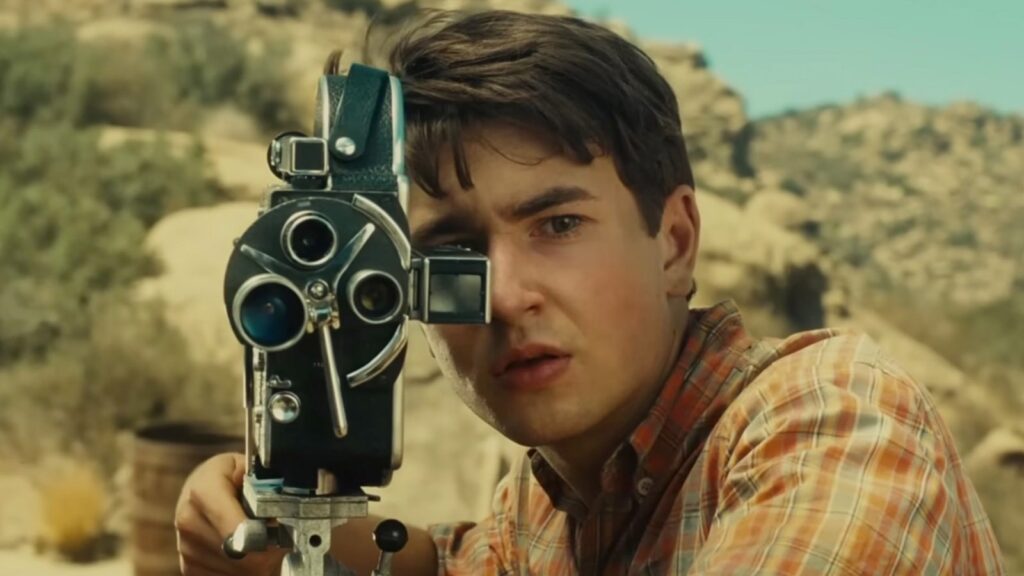
Steven Spielberg’s The Fabelmans is undoubtedly a valentine, but who is the target of its affection? Is it an ode to the movies—a celebration of the populist art form’s beauty and magic? Is it a self-congratulatory testament to Spielberg’s own genius, given that it chronicles a lightly fictionalized version of his childhood? Or is it meant as a gift to you, the audience—the appreciative populace that regularly crowds into auditoriums to stare upward at a silver screen? Early in the film, a young boy makes his first visit to the theater in 1952 in what proves to be a transformative experience; surrounded by hundreds of strangers, he gapes in awe, making the same wide-eyed face that he will spend the rest of his life earnestly recreating.
Watching The Fabelmans in a half-empty 53-seat multiplex, I felt a twinge of irony at that image; the notion of throngs of ticket-buyers piling into giant caverns to watch movies would seem to be less a halcyon vision than a distant memory. (Unless you’re talking about superhero flicks; across the hall, in its third week of release, Black Panther: Wakanda Forever was gobbling up $64 million, more than 20 times The Fabelmans’ gross.) But one of the lessons of this sweet, enchanting movie is that cinema can retain its power in settings that are intimate as well as expansive, and that art can be a vehicle for personal expression in addition to a commercial product. It may find Spielberg operating in a gentler register than typical, but that sensitivity hasn’t dulled his instincts as an entertainer or hampered his gifts as a storyteller.
Those gifts, in The Fabelmans’ telling, developed early. The film’s opening act examines how the young Sammy Fabelman (Mateo Zoryon Francis-DeFord), inspired by The Greatest Show on Earth, begins turning his modest New Jersey home into a non-stop production shoot—constantly wielding an 8mm camera, recruiting his siblings as actors, and turning ordinary objects into props and set dressings. (Searching for toilet paper, an exasperated relative discovers that every roll in sight has been conscripted for costuming mummies.) Spielberg observes this burgeoning passion with obvious pleasure and fluid grace—the actual camera, operated by his longtime collaborator Janusz Kaminski, moves with characteristic suppleness, as during an early zoom on Sammy’s face when he manufactures a miniature train crash—but in these wistful early scenes, he isn’t purely indulging in boyhood nostalgia. He is also quietly, studiously establishing the foundation of Sammy’s household, and setting the stage for the reverberations to come.
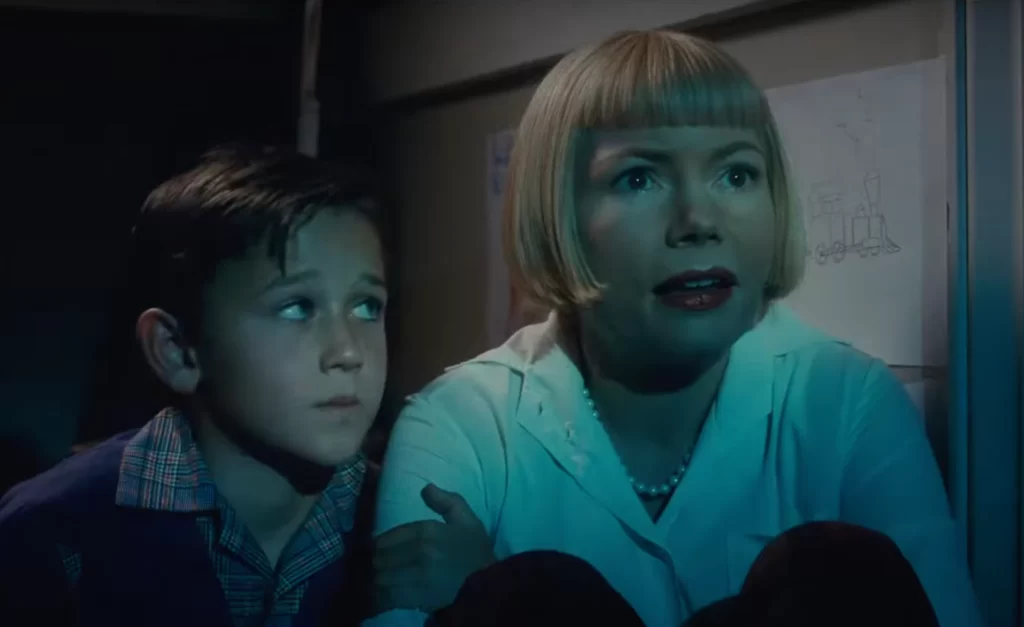
Sammy’s father, Burt (Paul Dano), is a virtuosic engineer who enjoys describing the inner workings of machines. His mother, Mitzi (Michelle Williams), is a former pianist whose flighty, artistic temperament complements and sometimes clashes with her husband’s more grounded, scientific rigor. He has two younger sisters—wait, make that three—who regard his filmmaking obsession with a mixture of support, curiosity, and indignation. (Recognizing the unequal representation in their brother’s work, one of them later asks, “Ever think about making a movie with a girl?”) And his uncle Bennie (Seth Rogen), who isn’t actually a relative but is instead Burt’s colleague and close friend, attends holiday dinners like he’s part of the clan, occasionally drawing the ire of Burt’s disapproving mother (a withering Jeannie Berlin). Those hectic meals bustle with natural warmth—the screenplay, which Spielberg wrote with Tony Kushner, flows with rhythmic dialogue—even as they slowly illuminate an underlying tension that begins creeping toward the surface.
The Fabelmans, then, isn’t just a tender coming-of-age story; it is also a domestic family melodrama. It examines, with a combination of empathy and melancholy, the swirl of combusting desires and logistical challenges that infect its central circle. There’s a reason the title is plural; Spielberg and Kushner understand how each Fabelman’s actions can possess a collective impact, rippling their way across the entire unit. Some of their struggles are proverbial: Burt’s repeated promotions force him to uproot his wife and kids multiple times (first to Phoenix, then later to Northern California), while Mitzi’s loneliness causes her to spiral into anguish and exhaustion. (Early on, she throws the children into their mint-green Cadillac and speeds them off toward a tornado, an arguably too-neat encapsulation of her recklessness.) Others are more specific, in particular Burt’s worry that Sammy’s zeal for his “hobby”—and his corresponding apathy toward real-world disciplines like algebra—will hinder his professional prospects.
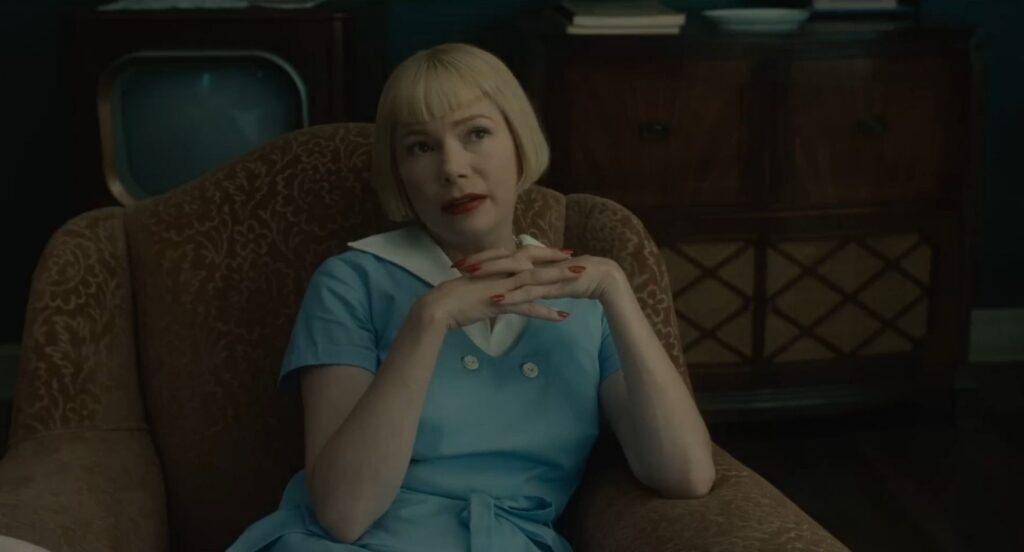
The subtle brilliance of The Fabelmans lies in how smoothly it integrates these conflicts into a unified story—how the prosaic and the poetic intersect. Sammy’s family inspires his movies, and his movies affect his family. There are times when these collisions threaten to become didactic, as when the teenage Sammy (now played by Gabriel LaBelle) receives a visit from his great-uncle (a delightful Judd Hirsch), a grizzled prophet who warns him that his art will always be at war with his kin, or when Burt implores Sammy to postpone a conveniently scheduled shoot and instead comfort his grieving mother. But the writing is too nimble and the acting too persuasive for the film to lapse into schematic talking points. Its most powerful passage arrives in the wake of that most familiar familial adventure—a camping trip—which Sammy greedily captures with his camera; while editing the resultant footage, he stumbles upon a secret that transforms the young man and the movie alike.
Spielberg twice demonstrates the monumental impact of that minimal recording—first via Sammy as its creator, then through Mitzi as its viewer when her son ushers her into a closet and makes her bear witness. For the latter, Spielberg keeps his camera trained on Williams’ face, watching quietly—the gorgeous, piano-driven score is of course supplied by John Williams—as recognition flashes in her eyes and shame flickers across her brow. It’s the signature scene in a tremendous performance, the greatest star turn of Williams’ career (at least on the big screen; you might make a case for Fosse/Verdon)—big and bold, but flecked with details that accentuate the character’s longing and sorrow. Yet it doesn’t crowd out the other actors; again, this is an ensemble picture, and Williams makes ample room for her costars. As a decent man who can’t quite piece his life together, Dano is heartbreakingly restrained, while Rogen bends his natural playfulness with deceptive purpose; his Bennie constantly lingers on the periphery, for reasons that neither the Fabelman children nor the adults seem to fully comprehend. Equally impressive is LaBelle, who articulates Sammy’s emotional paralysis while also communicating the rapture he takes in applying his craft.
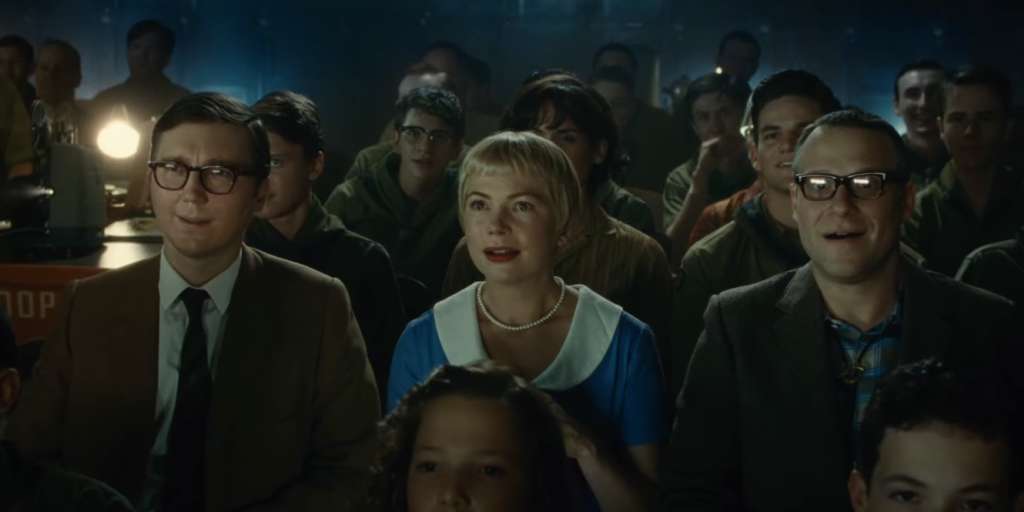
Does that remind you of anyone? The Fabelmans carries with it an inevitable measure of solipsism; it’s a Steven Spielberg movie in which a young Spielberg makes movies, all of which are admired by slack-jawed audiences constantly making The Spielberg Face. (Sensibly, and perhaps disappointingly, there are no cheesy references gesturing toward future works.) Yet just as Spielberg’s own productions consistently overpower their sentimental mushiness through the sheer force of their artistry, the creation scenes here are too damn enjoyable to be pious or self-regarding. There are wonderful touches, as when Sammy despairs that the shootout in his gun-toting Western looks fake, then magically invents muzzle flashes by inserting pinpricks into the film stock. (Obviously, The Fabelmans itself was shot on lustrous 35mm.) In addition to gleaming with verisimilitude, these sequences are also very funny; when Sammy attempts to give a note to the hero of his amateur war picture, the bemused boy responds, “So you want me to, like, act and stuff?”
In its final act, The Fabelmans (and the Fabelmans) heads west, watching fretfully as Sammy enters high school and assimilates into “the land of the giant sequoia people.” The teenage touchstones that follow—mean jocks, first kisses, social anxieties and humiliations—feature a whiff of conventionality that the rest of the film evades. But they remain interesting, not only because of the crispness of the characters—Sammy, who starts going by “Sam,” begins dating a pretty girl (a winning Chloe East) who slowly draws him from his shell, and whose reverence for Christ is matched only by her fervor for kissing—but also because they function as an unusually frank portrait of post-war American Jewishness. The prejudice that Sam faces is disturbingly casual as well as cruel, and is understood to be less hateful than typical. “Everyone hates Jews, except other Jews” a blond goon tells Sam—a stinging taunt that lingers in the consciousness of the boy who will grow up to make Schindler’s List.
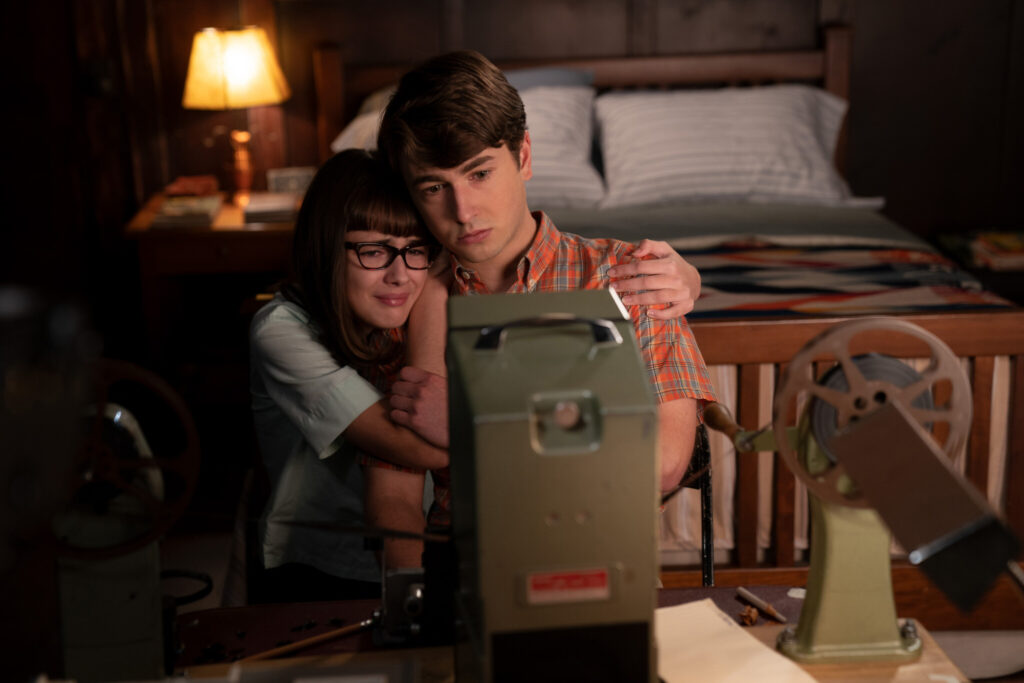
That goon becomes the unwitting protagonist of Sam’s most operatic production: a 16mm diary of the school’s “ditch day,” complete with sun-dappled bodies and slow-motion races and cheekily edited crudities. It’s a fun sequence that also speaks to cinema’s mighty capabilities—not just to document, but to distort, and to twist images into narratives. Using little more than a spiffy new camera and his own artistic vision, Sam discovers his capacity to reshape the world.
But let’s not get carried away. For all its color and polish, The Fabelmans is less grand than most of Spielberg’s recent works: less visually ravishing than West Side Story, less thematically sonorous than The Post, less classically suspenseful than Bridge of Spies. But that doesn’t make it a lesser movie; instead, its pleasures are appropriately scaled to its characters. Late in the picture, Sam bickers with one of his sisters (Julia Butters, from Once Upon a Time in Hollywood) amid yet another family squabble, only for them to reach a détente when he shows her the latest cut of his new project. She rests her head on his shoulder, he holds her arm, and together they peer into a tiny screen. It’s a beautiful moment—a fleeting instant of communion for two loved ones, briefly losing themselves in the timeless medium that continues to beguile wide-eyed viewers across the globe.
Grade: A-
Jeremy Beck is the editor-in-chief of MovieManifesto. He watches more movies and television than he probably should.
